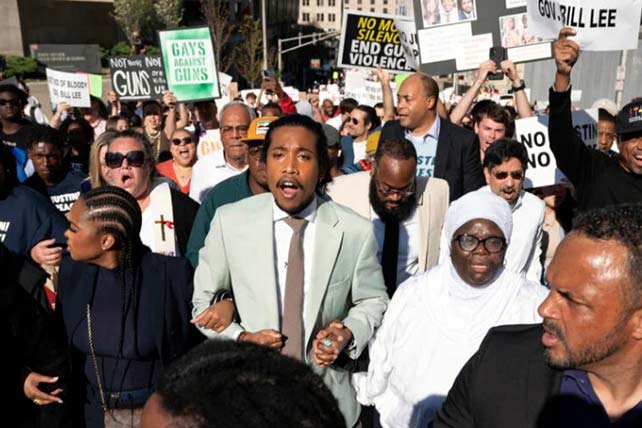(RNS) — When Justin Jones marched toward the Tennessee Capitol building last week, he was flanked by so many people that cameras struggled to pick him out of the crowd. But as he approached the doors to the House chamber, the crowd thinned to just a few, as Jones linked arms with a local lawmaker and two faith leaders. One held a Bible. Another, the Rev. Ingrid McIntyre, was donned in a stole. Together, they sang the gospel spiritual “This Little Light of Mine.”
“It was important to him to have clergy with him,” McIntyre, a local activist and United Methodist minister who serves two churches in Nashville, said of Jones about the day he was reinstated as a member of the Tennessee House of Representatives.
His return came just days after the Republican-dominated legislature expelled Jones and his colleague Justin Pearson for staging a protest on the House floor in support of gun control, following the deadly shooting at Nashville’s Covenant School. The expulsion — and triumphant return — of “The Justins,” as they’ve come to be known, captured national attention and brought a spotlight to the growing tension between Tennessee’s majority Republican Congress, and its crop of young activist lawmakers elected to represent the state’s blue cities.
RELATED: 9-Year-Old Hero Evelyn Dieckhaus Tried To Warn Covenant School Classmates Before Being Fatally Shot
At the heart of that activism is a faith-infused advocacy environment common in the South, where coalitions of local religious communities — particularly Black churches, mainline Protestants and interfaith organizations — often partner with national faith-led activist groups, such as the Poor People’s Campaign, to champion liberal policies.
Both Jones (27), and Pearson (28), cut their teeth working with faith-led movements in Nashville and Memphis, respectively, as well as with the Poor People’s Campaign. Their faces were familiar as fellow protesters alongside faith leaders like McIntyre long before they raised their bullhorns on the House floor. And it came as no surprise to those who knew them when both men appealed to God and Scripture as they defended themselves against allegations from Republican colleagues this month, who declared their protest a violation of House rules and ultimately expelled them.
Both Pearson and Jones were promptly reinstated by local councils in their districts.
For McIntyre, last week’s march to the state Capitol was simply one in a list of “intense” moments she has shared with Jones, who once interned for her at Open Table Nashville, an interfaith, poverty-focused organization McIntyre co-founded in the city. This month isn’t even the first time she’s demonstrated with Jones inside the state Capitol, she said, recalling an instance in 2016 when Jones and others served Communion to each other outside the House speaker’s office amid a protest for health care access.
Tennessee, McIntyre noted, is home to an array of faith-based advocacy groups, such as the Interdenominational Ministers Fellowship in Nashville or the Memphis Interfaith Coalition for Action and Hope, which goes by the name MICAH.
“Organizing people of faith matters,” she said.
During a press call in early April, the Rev. William Barber, co-founder of the activist group the Poor People’s Campaign, described a yearslong relationship with Jones, who has participated in the organization’s Moral Monday demonstrations.
RELATED: Pastor’s 9-Year-Old Daughter Was One of the Victims in Covenant School Shooting
When Barber, now head of an advocacy-focused center at Yale Divinity School, described Jones as a graduate of Vanderbilt Divinity School in a separate press call last week, Jones gently corrected him. Explaining he has one semester left, Jones, who sometimes refers to Barber as a sort of “godfather,” said he has already received an education in faith-fueled activism.

